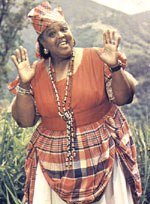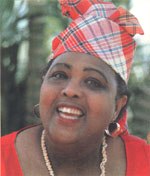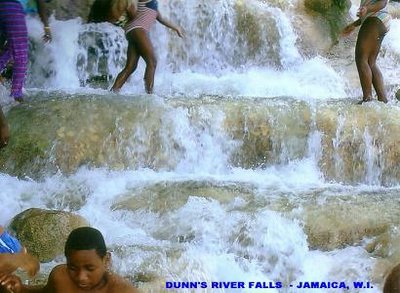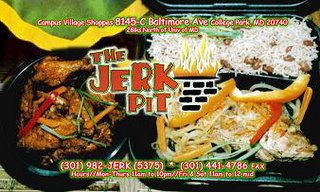
The Jamaican Culture and Politics
The Jamaican Culture is closely tied to Jamaican politics. Some of this was noted when reggae music was used to negotiate a truce between the two major political parties - the Jamaica Labour Party (JLP) and the People's National Party (PNP).
Bob Marley was asked by the leaders of the two major political parties to perform at a truce-making concert held on April 22, 1978. During the concert, Bob Marley encouraged Edward Seaga (JLP) and the late Michael Manley (PNP) to shake hands on stage.
The Jamaican Culture, through its music, is presently being used by both political parties in their 2007 election campaigns. All the songs being created for this campaign are based on our cultural music. The Jamaican politicians know that music is a key ingredient in their pursuit to attract the support of the Jamaican people.
Because Jamaicans love their music, Politicians are using it to their benefit!
Prime Minister Portia Simpson-Miller and the Abeng
Jamaica’s Prime Minister Portia Simpson-Miller says that she will sound the Abeng on election night at the People’s National Party’s (PNP) headquarters. "It was given to me by the Maroons of Accompong and I will sound it, the victory sound at Old Hope Road on the 27th" Prime Minister Portia Simpson said on Nomination Day in her South West St. Andrew constituency.
What is the Abeng?
The Abeng is a kind of bugle which is made from a cow’s horn and was used by the Maroons as a warning to others whenever they spotted the English forces.
Who are the Maroons?
The Maroons were the freed or runaway slaves left behind by the Spanish when the British took over Jamaica.
2007 General Elections in Jamaica
The major political Parties contesting the 2007 General Elections are the Jamaica Labour Party (JLP) and the People's National Party (PNP), along with some independent candidates. The leaders of the major Parties are Bruce Golding and Portia Simpson-Miller respectively. The Elections, which were scheduled to be held on August 27, 2007 was postponed until September 3, 2007, due to Hurricane Dean hitting Jamaica on Sunday, August 19, 2007.
Unfortunately, violence plays a significant role in the Jamaican political system.
It is being reported that this Election will be a close race between the JLP and PNP.
Politics & Jamaican History
- In 1655, Jamaica became a British Colony.
- In 1944, the first General Elections were held under Universal Adult Suffrage.
- In 1953, Sir Alexander Bustamante became Jamaica’s first Chief Minister.
- Norman Washington Manley was Chief Minister of Jamaica from 1955-1959 and Premier from 1959-1962.
- On January 3, 1958, the West Indies Federation was formed to create a political union among its Caribbean members. This union was short-lived since the majority of Jamaicans voted in a Referendum in 1961 to come out of this Federation.
- In April 1962, Sir Alexander Bustamante became the first Prime Minister of Jamaica.
- On August 6, 1962, Jamaica gained its Independence from the British.
- Since August 6, 1962 (Jamaica’s first Independence Day) Jamaica has been a member of the British Commonwealth. Queen Elizabeth II is its reigning Monarch and the Governor General is her Representative.
- On August 7, 1962, Jamaica had its first Parliamentary Session. It was opened by Princess Margaret of England, who was representing her sister, the Queen of England.
- In 2002, Jamaica’s Parliament removed the requirement for anyone holding public office to take the Oath of Allegiance to the Queen.
Overview
Marcus Garvey’s People’s Political Party (PPP) was Jamaica’s first political party. This Party was popular among poor black Jamaicans but the laws in force at that time prevented the development of the party. Universal Adult Suffrage, which gave the right to vote, was not yet granted and the Party was unable to gain the extensive support needed.
The People's National Party (PNP) and the Jamaica Labor Party (JLP) are the two major political parties in Jamaica. These two major political parties have historically been linked to the two largest Trade Unions - The JLP to the Bustamante Industrial Trade Union (BITU) and the PNP to the National Workers Union (NWU).
A third party, the National Democratic Movement (NDM), was launched in October 1995. This party is not linked to a trade union and its activities have been significantly reduced. The Jamaican Leader of the Opposition (Bruce Golding) was a founding member of this Party.
The History of the JLP and the PNP
- The JLP and the PNP were originally led by our National Heroes the Right Excellent Norman Washington Manley (PNP) and the Right Excellent Sir Alexander Bustamante (JLP) respectively. These leaders were both responsible for leading the Jamaican people throughout most of its modern history.
- Norman Manley was a Lawyer and Alexander Bustamante was a Trade Unionist.
The symbols for the Jamaica Labour Party are the Bell and the V sign and the People's National Party's symbols are the Head and the Clenched Fist.
Trade Union
- In 1938, dissatisfied workers throughout Jamaica identified Bustamante as their leader.
- On May 24, 1938, Bustamante was arrested for unlawful assembling and obstructing the police. Bustamante appeared before the Court and was set free to prevent continued civil unrest among the workers.
- In June 1938, to be able to better support the workers’ cause, The Bustamante Industrial Trade Union (BITU) was established.
- In September 1938, the People’s National Party was launched with Norman Manley as the leader.
- The Presidents of the PNP have been Norman Manley, Michael Manley, P.J. Patterson, Portia Simpson.
In 1940, due to World War II, Jamaica was under a State of Emergency. The Governor felt that Bustamante was a threat because he continued to speak out for the workers. Under the Defense of the Realm Act, Bustamante was arrested and sent to prison for 17 months. He was released on February 8, 1942.
What is the Defense of the Realm Act?
The Defense of the Realm Act (DORA) was passed during World War I in the United Kingdom. This Act gave the Government extensive powers during the war.
The Launching of the Jamaica Labour Party (JLP)
- Bustamante was a member of the PNP but he left the PNP and formed the Jamaica Labour Party on July 8, 1943. Bustamante also wanted to be recognized as a political leader in addition to being a Trade Union Leader.
- The Presidents of the JLP have been Alexander Bustamante, Donald Sangster, Hugh Shearer, Edward Seaga, Bruce Golding.
The National Workers Union (NWU), which is an Affiliate of the PNP, was launched on April 2, 1952. Norman Manley was the founder of the National Workers Union.
General Elections
Universal Adult Suffrage:
Universal Adult Suffrage is the right to vote regardless of your race, sex, belief or social status. Jamaica was the first British Colony to be granted Adult Suffrage. In 1944, Jamaica held its first elections under the Universal Adult Suffrage. This election marked the beginning of "party politics" in Jamaica and was won by the JLP.
Constituencies - Elections:
- Jamaica is divided into 60 constituencies for the purpose of elections.
- These constituencies are distributed throughout its 14 Parishes.
- These parishes are divided into 3 Counties namely:
Cornwall (Hanover, Saint Elizabeth, Saint James, Trelawny and Westmoreland)
Middlesex (Clarendon, Manchester, Saint Ann, Saint Catherine and Saint Mary)
Surrey (Kingston, Portland, Saint Andrew and Saint Thomas). - Each constituency is represented by one Member of Parliament who is elected by the Jamaican people during the Elections.
- On Nomination Day, the Candidates for each Political Party and Independent Candidates attend the Nomination Centres within their Constituency to hand in their Nomination papers. The proposed Candidate is required to submit a form with the names and signatures of 10 electors who are qualified to vote in the constituency. Traditionally, the 10 electors go along with the candidates to the Nomination Centre.
- Each Candidate is required to pay a fee to the Returning Officer for the constituency at the Nomination Centre.
- Party supporters usually visit the Nomination Centres on Nomination Day to give support to their Candidate.
A Returning Officer is responsible for a Constituency during Elections.
Election Campaigns
- After the date of the Elections is announced, the political parties start their intense election campaigning. The Jamaican Culture is noted for radical political views among the majority of Jamaicans. This oftentimes results in violence between rival party supporters. The political campaigns involve motorcades, house-to-house visits, meetings, ads (TV, Internet, radio, billboards and newspapers).
- JLP supporters refer to themselves as "Labourites" and will say "I am born a Labourite and I will always be a Labourite! "Labourite is in my blood". In the days of Bustamante, Labourites would sing: "I will follow Bustamante 'till I die...". PNP supporters refer to themselves as "Socialists" and will say "I am born a Socialist and I will always be a Socialist!", Socialist is in my blood!"
- Colors (green for the JLP and orange for the PNP) are used as identification by both political parties in their campaigns.
- Unfortunately, the period leading up to Election Day, is usually accompanied by some amount of violence by enthusiastic supporters.
The security forces (police and army) and Election Day Workers, vote before Election Day so as to be available for work on Election Day.
Election Day - Polling Stations:
- All schools are closed throughout Jamaica on Election Day and, by Law, it is mandatory that all workers are given time off from work to vote.
- Polling stations are set up at various Centres throughout each constituency. These centres are usually schools and church halls. Voting starts from 7:00 AM and closes at 5:00 PM.
- After registering their vote, the Voter must dip their right index finger into a red ink to verify voting. This is to deter the casting of multiple voting.
The Returning Officer, with the help of the security forces, is responsible for the transportation of the ballots from the polling stations to a designated area in each constituency for counting. All ballots from the various polling stations within each constituency are taken to this designated place.
Election Results:
When it is obvious as to which Party won the Election, there is usually a lot of jubilation in the streets by the supporters of the winning party. This involves massive motorcades and street dancing within each constituency.
Forming the New Government:
The Leader of the winning party usually becomes the Prime Minister of the new Government. The Governor General will advise the Leader to form a new Government.
Swearing in of the New Prime Minister
The Governor General swears in the new Prime Minister.
Who is the Prime Minister?
The most senior Minister of the Cabinet in the Executive Branch of Government in Jamaica’s Parliamentary System. The Prime Minister’s official residence is Jamaica House.
Who is the Governor General?
The Governor General is the Queen's Representative in Jamaica and resides at King’s House – his official residence.
Swearing in of the Leader of the Opposition
The Governor General swears in the Leader of the Opposition
Who is the Leader of the Opposition?
The Leader of the major political Party but not the Government.
The New Jamaican Parliament
- George William Gordon House is the residence of Jamaica’s parliament.
- On the day of the opening of the new Parliament, a large crowd, representing both political parties, assembles outside Gordon House.
- Jamaica is governed under its 1962 Constitution. Jamaica is a parliamentary democracy with a bicameral legislative system which is made up of a 21-member Senate and a 60-member House of Representatives. Parliament is made up of an appointed Senate and an elected House of Representative. Thirteen members of the Senate are nominated on the advice of the Prime Minister and eight are nominated on the advice of the Leader of Opposition.
A bicameral legislative system is a system of Government in which the legislature consists of two chambers or Houses.
Jamaican Politics - An Item of Interest
In 1940, at a public meeting, Bustamante made the following statement:
"I know this, that if Mr. Manley cooperates with me as I will with him, that we will do something for this country. I will say this without any boast, there is no greater power in this country than the combination of Manley and Bustamante. I intend to cooperate with the Party for the benefit of the masses. Any trouble that Manley and I may have in the future we will fight it out ourselves…"





